Kenya’s political landscape has long been a crucible of fervent activism and calculated betrayal, where the aspirations of the citizenry are ensnared in a cyclical charade of reformist zeal and elite co-optation. The “Moi Must Go” movement of the late 1990s and the “Ruto Must Go” movement of 2024, though separated by decades, reveal a hauntingly symmetrical pattern of populist agitation subverted by duplicitous machinations. Both campaigns, ostensibly driven by a clarion call for systemic overhaul, have been undermined by the very protagonists who ignited them, revealing a perfidious allegiance to the enduring colonial governing structure – a structure that thrives on the exploitation of Kenyan hopes while perpetuating elite dominance.
The “Moi Must Go” Movement: A Revolution Betrayed
In the late 1990s, Kenya stood at a crossroads, its citizenry galvanized by the “Moi Must Go” movement, a firebrand initiative spearheaded by a coalition of opposition politicians, civil society luminaries, and grassroots activists. Figures such as Martha Karua, Willy Mutunga, Kivutha Kibwana, Mukhisa Kituyi, and Timothy Njoya emerged as vanguards of change, railing against the autocratic excesses of President Daniel Arap Moi’s regime. The movement’s rhetoric was imbued with revolutionary fervor, promising a radical restructuring of Kenya’s kleptocratic state. Yet, beneath this veneer of defiance, a more insidious narrative unfolded.
The opposition’s ostensible radicalism was swiftly co-opted through strategic machinations. Key figures, including Raila Odinga, were absorbed into Moi’s government, their revolutionary credentials bartered for political expediency. Others, through clandestine agreements, assumed the role of nominal critics, tasked with inducing a state of lethargy among reform proponents. This was achieved by conditioning the public to fixate on the 2002 elections as the horizon for change, thereby suspending demands for immediate institutional and structural overhaul. The Inter-Parties Parliamentary Group (IPPG) reforms, a minimalist concession, epitomized this betrayal, offering superficial adjustments to the electoral framework while leaving the edifice of Moi’s regime intact.
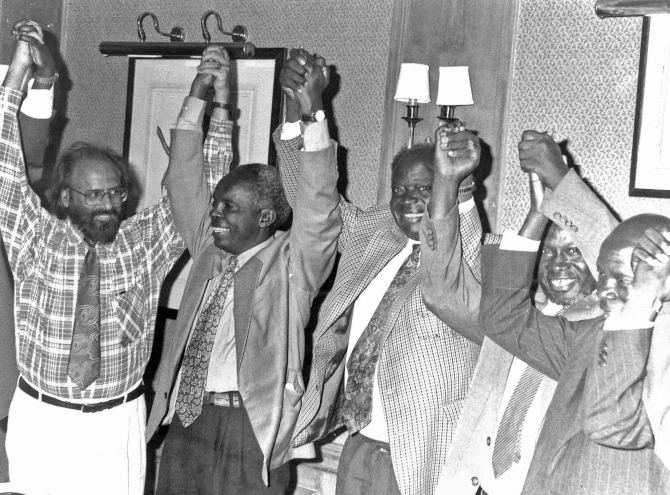
TRAITORS: The Inter Parties Parliamentary Group (IPPG) endorsed minimum reforms, delayed ouster of Moi allowing Kenya to be looted and plundered with reckless abandon
This period of calculated inertia provided Moi with a carte blanche to orchestrate a looting spree of unprecedented scale. The Kenya Posts and Telecommunications Corporation (KPTC) was dismembered, its mobile telephony division sold to Vodafone under opaque circumstances. The power sector was mortgaged to independent power producers like Iber Africa, saddling Kenyans with exorbitant electricity costs that persist to this day. The issuance of the second mobile operator license to KenCell, a consortium linked to Moi’s interests through Vivendi and Naushad Merali’s Sameer Group, further exemplified the rapacious plunder facilitated by this strategic lull. The citizenry, lulled into complacency by the promise of electoral salvation, was left to bear the consequences of a predatory elite consolidating its grip on national resources.
The “Ruto Must Go” Movement: A Reenactment of Deceit
Fast forward to 2024, and Kenya finds itself ensnared in a near-identical political theater with the “Ruto Must Go” movement. Sparked by the Gen Z-led protests against the Finance Bill 2024, this movement initially embodied a visceral rejection of President William Ruto’s administration, accused of economic mismanagement and authoritarian overreach. Yet, as with its predecessor, the movement’s revolutionary momentum has been deftly undermined by a coterie of familiar protagonists, many of whom – Martha Karua, Willy Mutunga, Mukhisa Kituyi, Fred Matiang’i, Eugene Wamalwa, Raila Odinga, Uhuru Kenyatta, and David Maraga – played roles in the earlier drama. The addition of newer figures, such as Boniface Mwangi, with his repertoire of performative activism, only amplifies the sense of orchestrated distraction.
The impeachment of Deputy President Rigathi Gachagua in October 2024, orchestrated with the imprimatur of the National Intelligence Service, serves as a pivotal act in this subterfuge. Ostensibly a response to Gachagua’s alleged divisiveness, the impeachment was a calculated maneuver to stall revolutionary momentum, redirecting public ire toward a singular figure while preserving the broader architecture of Ruto’s regime. The mantra of “one term” or “wantam,” aggressively propagated by opposition figures, mirrors the 1990s strategy of fixating public consciousness on the 2027 elections, thereby deferring demands for immediate systemic change. This rhetoric, cloaked in populist garb, serves to anesthetize the public, diverting attention from substantive conversations about dismantling the colonial governing structure that continues to underpin Kenya’s political economy.
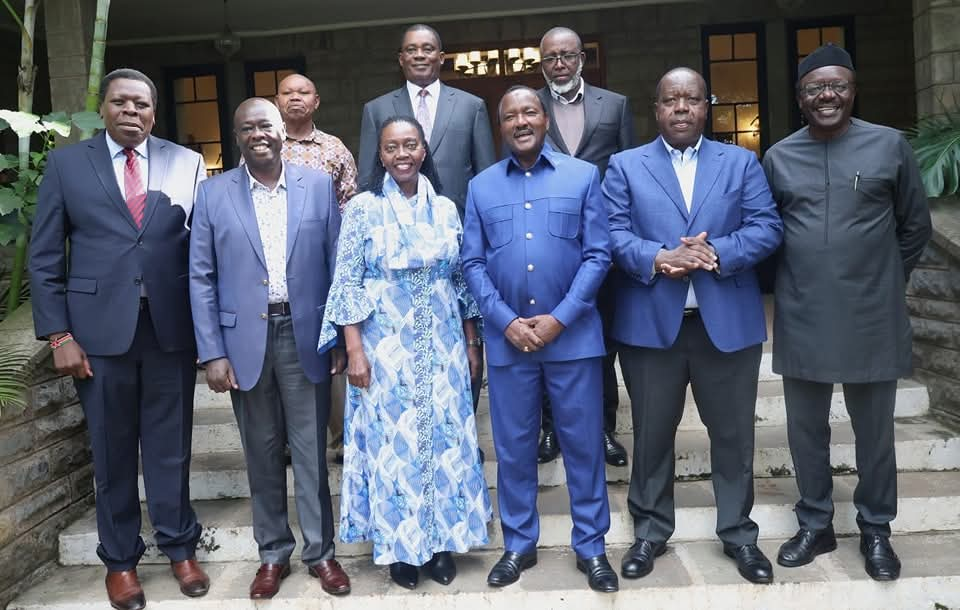
Psyop Operatives: This bandwagon of aging politicians were facilitated to extinguish revolutionary fervor instead pushing for 2027 elections
The parallels between the two movements are stark. Just as the IPPG reforms pacified the “Moi Must Go” movement, the current opposition’s flirtation with coalition-building – evidenced by high-level meetings involving Karua, Musyoka, Wamalwa, Matiang’i, and others – signals a willingness to settle for incremental concessions rather than a wholesale reconfiguration of the state. The co-optation of Raila Odinga, once a firebrand of reform, into Ruto’s orbit through cabinet appointments and a memorandum of understanding between ODM and UDA, underscores the fluidity of allegiances among Kenya’s political elite. Meanwhile, figures like Boniface Mwangi, whose activism often veers into performative spectacle, contribute to a cacophony of distraction, ensuring that the public remains mired in symbolic gestures rather than galvanized for structural change.
The Colonial Governing Structure: The Enduring Victor
At the heart of both movements lies the enduring triumph of Kenya’s colonial governing structure – a centralized, extractive apparatus designed to entrench elite power while marginalizing the masses. This structure, inherited from British colonial rule, thrives on the manipulation of ethnic and regional divisions, the co-optation of dissent, and the perpetuation of economic dependency. In the 1990s, Moi’s regime leveraged this framework to orchestrate a looting spree, while in 2024, Ruto’s administration employs similar tactics to consolidate power amidst economic hardship and public unrest.
The treachery of Kenya’s political elite lies in their complicity in this system. By suspending revolutionary demands in favor of electoral promises, they ensure that the colonial edifice remains intact, its mechanisms of exploitation – whether through privatized utilities, inflated contracts, or skewed resource allocation – continue unabated. The citizenry, repeatedly betrayed by the same cast of characters, is left to grapple with the consequences: soaring electricity tariffs rooted in Moi-era deals, a tax regime that punishes the poor, and a political class that thrives on the perpetuation of public disillusionment.
The BBC’s Machinations in Kenyan Politics: A Tale of Two Psyops
The British Broadcasting Corporation (BBC), often lauded as a bastion of journalistic integrity, has a less savory history of serving as a conduit for imperial agendas, particularly in post-colonial states like Kenya. Two pivotal moments in Kenyan political history – the “Moi Must Go” movement of the late 1990s and the “Ruto Must Go” movement of 2024 – reveal the BBC’s role in orchestrating psychological operations (psyops) that defused revolutionary momentum and entrenched the ruling elite. Through carefully crafted narratives, the BBC has repeatedly manipulated public sentiment, buying time for beleaguered regimes while preserving the colonial governing structure that continues to subjugate the Kenyan populace.
The 1999 Psyop: Legitimizing Moi’s Extended Reign
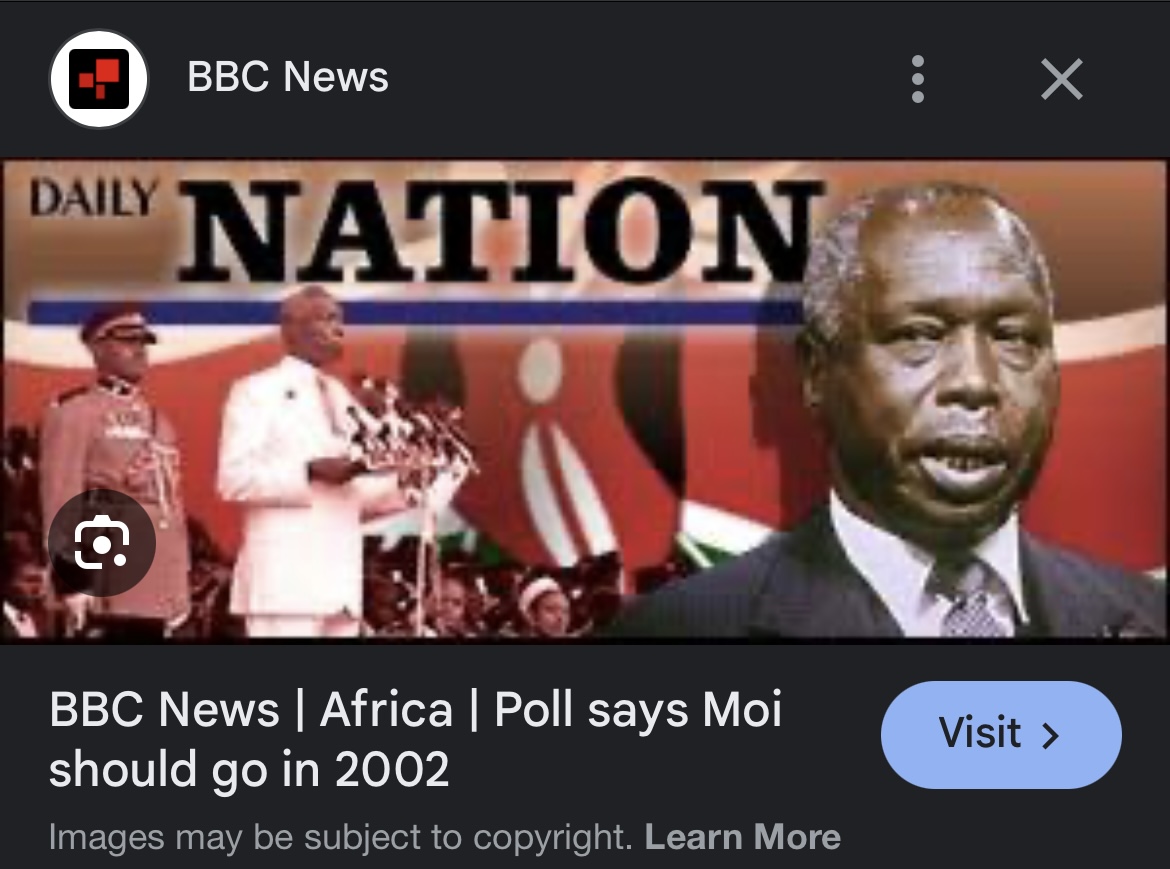
The BBC conducted an opinion poll in 1999 ostensibly meant to pacify Kenyans against early Moi removal and instead deferred dreams to 2022
In September 1999, as Kenya simmered with discontent under President Daniel Arap Moi’s autocratic rule, the BBC published a poll that would prove to be a masterstroke of political manipulation. The poll, ostensibly reflecting the will of the Kenyan people, declared that an overwhelming majority believed Moi should step down – but not immediately. Instead, it pegged his departure to 2002, the end of his constitutional term. This pronouncement, cloaked as a democratic exercise, was a deliberate psyop designed to pacify a restive populace and buy Moi three additional years in office.
The BBC’s poll, far from being a neutral report, served as a tool of the ruling elite, ensuring Moi’s regime could consolidate its gains while the public waited for a promised – but distant – liberation.
The 2024 Psyop: Blood Parliament and Ruto’s Reprieve
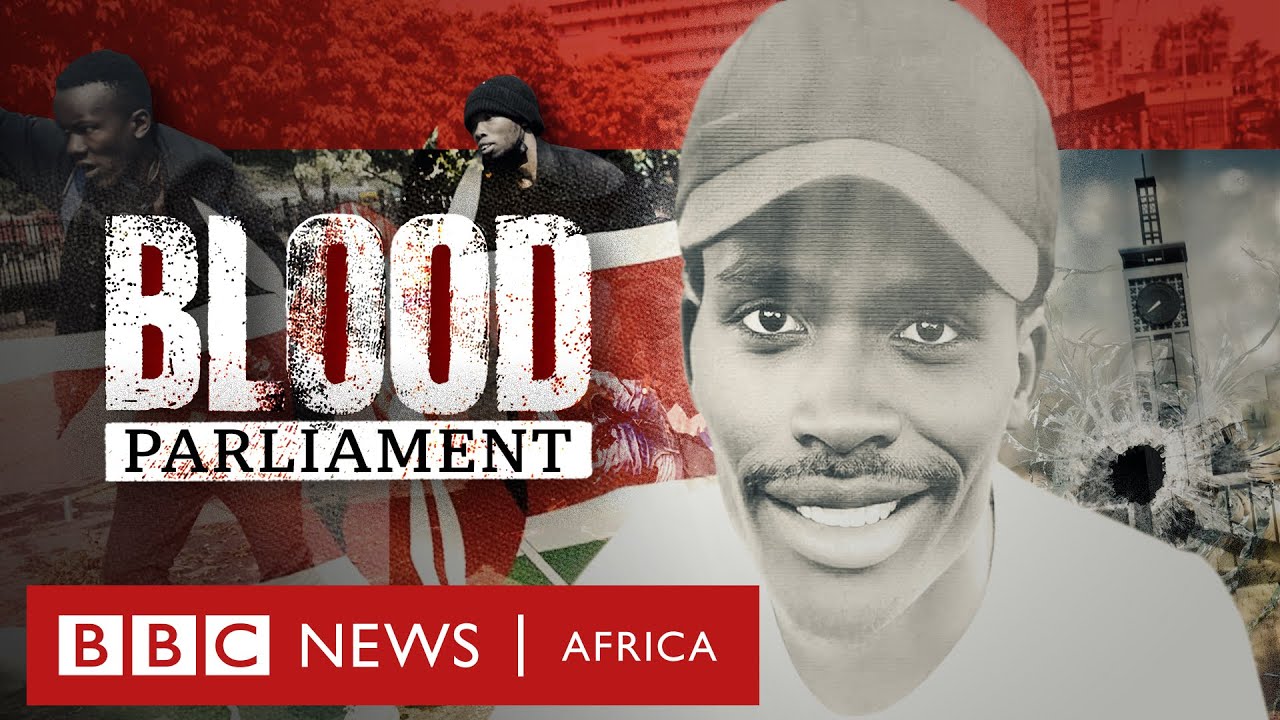
In 2024, the BBC released the Blood Parliament documentary meant to trigger fear and compliance with the mainstream agenda to allow William Ruto to remain in office until 2027
Fast forward to 2024, and the BBC once again positioned itself as a key player in Kenyan politics, this time amidst the “Ruto Must Go” movement. Sparked by the Gen Z-led protests against the Finance Bill 2024, the movement sought to oust President William Ruto, whose administration was accused of economic mismanagement and authoritarian overreach. As public anger reached a crescendo, the BBC launched a documentary series titled “Blood Parliament”, a production that, while ostensibly exposing the violence and corruption within Ruto’s government, served a more sinister purpose.
“Blood Parliament” featured a cast of carefully selected voices – activists, politicians, and commentators – who were coached to sell a narrative of fear and inevitability. The series highlighted the brutality of state security forces, but its underlying message was clear: change would come, but only through the ballot in 2027. By emphasizing and amplifying voices that urged patience, the BBC once again deflated revolutionary momentum, redirecting public energy toward a distant electoral horizon. Figures like Boniface Mwangi, Hanifa Adan, Embakasi East Member of Parliament Babu Owino and Law Society of Kenya President Faith Odhiambo played their parts in this orchestrated drama, ensuring that the public remained fixated on 2027 rather than demanding immediate structural change.
The parallels to 1999 are striking. Just as the Moi-era poll bought time for a looting spree, “Blood Parliament” has provided Ruto with a reprieve to consolidate power. The impeachment of Deputy President Rigathi Gachagua in October 2024, orchestrated with the backing of the National Intelligence Service, further distracted from systemic issues, channeling public ire toward a single figure while preserving Ruto’s regime. The BBC’s intervention, far from being a journalistic endeavor, was a calculated psyop, designed to sanitize Ruto’s administration and entrench the status quo.

The guests featured on BBC’s “Blood Parliament” included Boniface Mwangi, Hanifa Adan, Babu Owino and Faith Odhiambo
The BBC as an Instrument of Imperial Agendas
The BBC’s interventions in 1999 and 2024 reveal a consistent modus operandi: leveraging its global credibility to manipulate narratives in favor of Kenya’s ruling elite, all while preserving the colonial governing structure that has long underpinned the country’s political economy. As a state-funded entity, the BBC has historically served British interests, and its actions in Kenya are no exception. By buying time for Moi and Ruto, the BBC ensured that the centralized, extractive systems inherited from colonial rule – systems that benefit both local elites and foreign interests – remained intact.
In both instances, the BBC’s psyops relied on a sophisticated understanding of Kenyan psychology, exploiting the public’s yearning for change while channeling it into safe, manageable outlets. The 1999 poll and “Blood Parliament” were not mere journalistic exercises; they were instruments of control, designed to pacify dissent and perpetuate a cycle of exploitation. The losers, as always, were the Kenyan people, left to grapple with the consequences of deferred dreams: a plundered economy in the 1990s, and a repressive regime in 2024.
The BBC’s role in Kenyan politics underscores the enduring influence of colonial legacies, where foreign media outlets collude with local elites to maintain systems of oppression. For Kenyans to reclaim their agency, they must reject the manipulated narratives peddled by outlets like the BBC, recognizing that true change cannot be deferred to a distant election. The “Moi Must Go” and “Ruto Must Go” movements, though thwarted by treachery, offer a blueprint for resistance: a demand for immediate, structural reform that dismantles the colonial edifice once and for all. Only by breaking free from the BBC’s psyops – and the elite agendas they serve – can Kenyans chart a path toward genuine liberation.
Conclusion: Breaking the Cycle of Betrayal
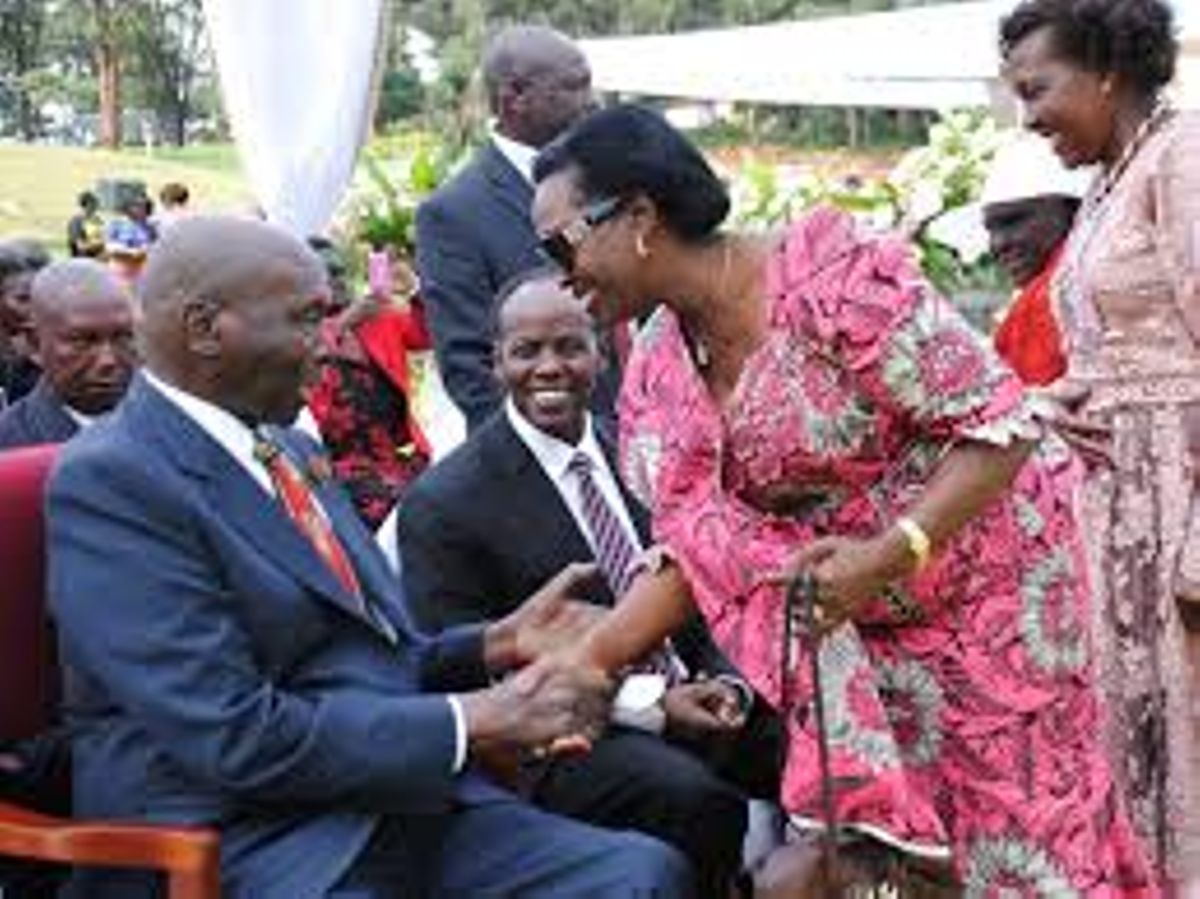
Always been a traitor: Martha Karua is all smiles as she meets Daniel Arap Moi long after the IPPG deception
The “Moi Must Go” and “Ruto Must Go” movements, though separated by time, are united by a common thread of treachery, where the promise of liberation is subverted by elite machinations. The protagonists – Karua, Mutunga, Kituyi, Matiang’i, Wamalwa, Odinga, and others – have, wittingly or unwittingly, played their parts in this re-enacted political theater, ensuring that the colonial governing structure emerges as the perennial victor. For Kenyans to break this cycle, they must reject the seductive allure of deferred dreams, demanding not just electoral change but a fundamental dismantling of the systems that perpetuate their subjugation. Only then can the nation move beyond the shadow of its colonial past and toward a future where the aspirations of its people are no longer held hostage by a perfidious elite.

